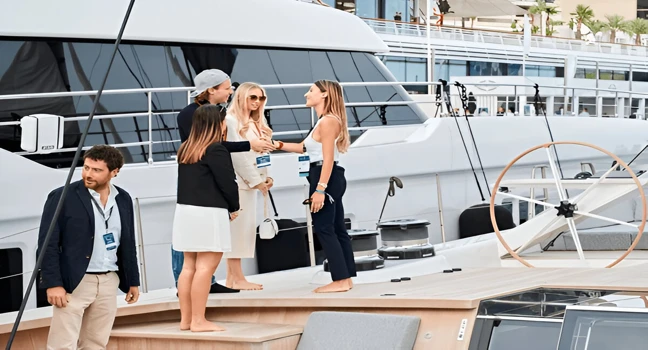The right yacht broker plays a crucial role as you step into the world of yacht ownership. The appeal of living aboard has grown over the last several years. This growth comes especially when you have rising costs of traditional home ownership, which leads many people to choose yachts as lifestyle choices and potential investments. Boats as small as 26 feet let you enjoy the yachting lifestyle while offering plenty of amenities for leisure and travel.
A yacht broker’s value becomes clear quickly. These professionals guide you through the complex process to find, evaluate, and purchase the perfect vessel that matches your needs. Looking for a qualified yacht broker near you connects you with experts who know local regulations, such as Florida’s 2021 anchorage management laws, and help you avoid getting pricey mistakes. They’ll direct you through tax advantages too – most people don’t know that yachts with permanent galleys, toilet facilities, and at least one bed qualify for tax deductions just like real estate mortgages. This piece walks you through essential knowledge about finding and working with the broker who will turn your yachting dreams into reality.
What does a yacht broker actually do?
Yacht brokers act as specialized intermediaries between yacht buyers and sellers. They make yacht transactions much smoother than buying a car or house. Yacht purchases involve many moving parts and complex systems that need expert guidance.
Helping you find the right yacht
A yacht broker’s main goal is to match you with your ideal vessel. Marine transactions happen less often than car sales, so detailed information about specific yacht models can be hard to find online or in standard valuation guides. Professional yacht brokers keep extensive databases of recent sales figures that give them quick access to vital information to assess any particular vessel.
Good brokers have firsthand knowledge about various yacht models and give unbiased opinions about their condition and value. They pay attention to your specific needs and think over factors like:
- Your intended use (weekend cruising, long-distance voyaging, entertaining)
- Budget constraints
- Desired features and amenities
- Experience level and sailing skills
Your broker saves your time by focusing only on boats that match your requirements. They often know about boats not yet officially listed, which gives you early access to potential gems before they hit the open market.
Handling negotiations and paperwork
The paperwork starts once you’ve found your perfect yacht—and there’s plenty of it. Yacht brokers manage key documents including:
- Purchase agreements and contracts
- Title transfers and registration
- Bill of sale and other legal documents
- Loan payoffs for the seller (if applicable)
Brokers also handle the delicate negotiation process between buyer and seller. They assess offers based on terms, conditions, and market realities, and advise on the best course of action. Their expertise helps you get favorable terms while avoiding common pitfalls in buyer-seller discussions.
Brokers can arrange financing options for buyers and help with changing USCG documentation. They keep separate bank accounts for holding deposits, with contractual language that specifies contingencies and conditions for fund returns if sales fall through.
Coordinating surveys and sea trials
One of the broker’s most valuable services is organizing thorough vessel inspections. Yachts should undergo professional surveys and sea trials before any purchase is final—your broker coordinates this process naturally.
A sea trial usually lasts 30-60 minutes. You’ll test the vessel’s seaworthiness and handling characteristics during this time. Your broker reviews specifications and history beforehand to ensure accurate documentation before you arrive.
Professional surveyors conduct detailed inspections both in and out of water after the sea trial. Brokers help explain these technical reports and translate complex marine terminology into clear information. Your broker can negotiate with the seller if surveys show needed repairs, which could save you money.
Quality brokers remain valuable resources throughout your ownership. They recommend captains, connect you with trusted service providers, and help with warranty claims.

How to research and compare yacht brokers
Research plays a vital role before you trust someone with your yacht transaction. A great broker needs expertise, integrity, and proven results. You need to evaluate several factors to find the right one.
Check licenses and certifications
Your first step should be to verify professional credentials. Not all states require licensing. States that do need proof of sales experience, background checks, and sometimes surety bonds that protect clients financially. Any reputable broker will share their licensing status and renewals.
Simple licensing is just the start – look for brokers with advanced professional certifications. The Certified Professional Yacht Broker (CPYB) designation shows a higher level of expertise. The Yacht Brokers Association of America (YBAA) recommends this certification. To qualify, brokers need:
- At least three years in yacht sales and brokerage
- Proof of proper trust or escrow accounts
- History of using legal sales contracts
- All required state licenses
Certified brokers must pass tough exams that cover transaction processes, legal requirements, and ethical standards. Membership in groups like the International Yacht Brokers Association (IYBA) shows their dedication to industry standards.
Look for reviews and testimonials
Client feedback is a great way to get insights into a broker’s reputation and service quality. Industry websites and forums often show patterns about how brokers operate. Reviews highlight their communication style, negotiation skills, and support after the sale.
Other yacht enthusiasts can give you the best recommendations. Talk to people at your local marina who have worked with brokers before. Their direct experience helps paint a full picture of what you can expect.
Note that respected brokers foster long-term client relationships. Repeat business and loyal clients suggest that a broker meets or exceeds expectations consistently.
Ask about recent sales and experience
The broker’s track record with boats like yours matters. Experience with specific yacht types gives crucial insights into common problems, fair pricing, and negotiation power. Make sure to ask about:
- Recent deals with similar yachts
- Years in the industry
- Knowledge of your preferred yacht category
- Network of surveyors, mechanics, and service providers
Quality brokers stay up-to-date through research, industry events, and tracking advances in yacht design. Their network of contacts – including shipyards, designers, and maritime lawyers – proves valuable throughout the process.
After you think over these factors, create a shortlist of brokers who match your needs and priorities.

Key questions to ask before hiring a yacht broker
The interview process becomes your chance to assess who will best represent your interests after narrowing down potential yacht brokers. You can identify the right professional for your specific needs by approaching these conversations like job interviews.
What’s your commission structure about yacht broker?
The standard yacht brokerage fee typically runs 10% of the final selling price. The seller, not the buyer, pays this commission. Larger yacht transactions often use a sliding scale—10% on the first $10 million, 5% on the second $10 million, and 2.5% on anything above.
You should be cautious of brokers offering substantially discounted rates, as this often shows they have nothing more to offer than the discount itself. Professional yacht brokers earn their commission by providing extensive services including:
- Digital advertising campaigns
- Professional photography and videography
- Ongoing marketing and promotion
- Handling all closing paperwork
Make sure all brokerage fees and expenses will be clearly specified in writing before proceeding.
Do you specialize in certain types of yachts?
A broker’s specialization plays a vital role in the process. Jon Burkard of Allied Marine puts it clearly: “In the yacht sales business, the broker’s compensation is commission-based – if you don’t sell, you don’t eat!”
Look for brokers with extensive experience in your specific yacht category. Here are some quality questions to ask:
- “How many yachts like what I’m seeking have you sold recently?”
- “What’s your experience with this particular brand/model?”
- “Can you operate this type of vessel yourself?”
Your broker should show deep knowledge of your targeted yacht type and have connections with appropriate surveyors and service providers.
How do you handle yacht broker buyer representation?
Understanding the fiduciary relationship is significant. The listing broker works for the seller unless specified otherwise. But you can work with a buyer’s broker who represents your interests exclusively.
The best part? Buyer representation comes as a free service. The seller still pays the commission, and buyer’s brokers typically receive their share through co-brokering. This arrangement gives you someone to support you through the whole process who can:
- Help narrow your search based on your specific needs
- Access accurate pricing data on comparable sales
- Negotiate more effectively on your behalf
- Attend surveys and sea trials with you
- Recommend reputable surveyors
Note that dual agency (where one broker represents both buyer and seller) can create potential risks.
Making the final decision with yacht broker
Chartering a yacht depends on several key factors. This piece explores how yacht brokers guide you through the complex world of yacht deals. They act as your trusted partners every step of the way.
Your broker plays multiple crucial roles. They help find your ideal vessel and handle tough negotiations. The paperwork and inspection coordination fall under their responsibility too. The prestigious CPYB designation can make the most important difference in your buying experience, so take time to check those credentials.
A broker’s reputation shines through client testimonials. Look for patterns in feedback and ask direct questions about commission structures. Don’t forget to discuss yacht specializations and buyer representation agreements.
The right yacht broker builds a relationship based on trust and expertise. They should grasp both technical yacht details and your dreams of life on the water. Having the right professional beside you turns your trip to yacht ownership into a smooth sailing experience instead of an uncertain voyage.
FAQs
Q1. What is the typical commission structure for yacht brokers? The standard yacht brokerage fee is usually 10% of the final selling price, typically paid by the seller. For larger yachts, some brokers use a sliding scale. Be cautious of significantly discounted rates, as they may indicate limited services.
Q2. How do I know if a yacht broker is qualified? Look for brokers with proper licensing and advanced certifications like the Certified Professional Yacht Broker (CPYB) designation. Check their experience, recent sales of similar yachts, and client reviews. Membership in professional organizations like the International Yacht Brokers Association (IYBA) is also a good indicator.
Q3. What services does a yacht broker provide? A yacht broker helps you find the right vessel, handles negotiations and paperwork, coordinates surveys and sea trials, and can assist with financing options. They also provide valuable market insights, access to unlisted yachts, and ongoing support throughout the ownership process.
Q4. Should I use a buyer’s broker when purchasing a yacht? Yes, using a buyer’s broker is recommended. They represent your interests exclusively, help narrow your search, access accurate pricing data, negotiate on your behalf, and attend surveys and sea trials with you. Best of all, their services are typically free for buyers, as they share the commission with the listing broker.
Q5. What size yacht is best for a beginner? For beginners, yachts in the 40-50 foot range are often ideal. This size allows you to get a feel for yacht ownership without requiring a crew or captain to manage it. However, the best size depends on your specific needs, experience, and intended use of the yacht.




